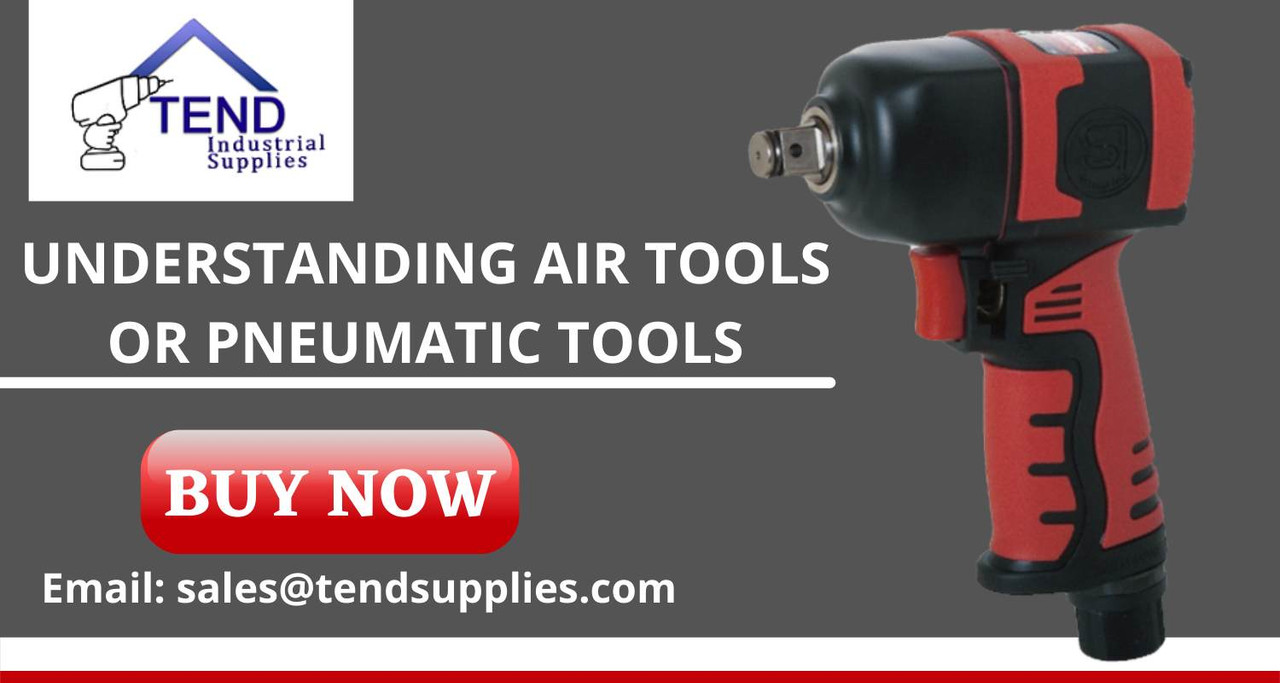Understanding Air tools or pneumatic tools
Understanding Air Tools or Pneumatic Air Tools
Air tools, or pneumatic tools, are devices powered by compressed air. These tools are prevalent in various industries due to their efficiency, power, and safety features. This article aims to provide a more in-depth understanding of air tools, their advantages, and how to choose a suitable compressor. Common types of these air-powered you may already know about that are used in the industry include buffers, nailing and stapling guns, grinders, drills, jackhammers, chipping hammers, riveting guns, sanders, and wrenches.
What are Pneumatic Air Tools?
Air tools are devices that utilize compressed air to function. Some common examples of these tools include buffers, nailing and stapling guns, grinders, drills, jackhammers, chipping hammers, riveting guns, sanders, and wrenches. These tools are known for their power, speed, precision, and relatively lightweight nature, making them suitable for extended use. Some are handy in situations where portability is essential.
How Do Pneumatic Tools Work?
Pneumatic tools convert compressed air into mechanical work using a pneumatic motor. From a safety perspective, these tools are safer than their electric or battery-powered counterparts. They don't produce sparks, eliminating risks like short-circuits or electrocution. Additionally, air tools offer a high power-to-weight ratio, meaning they can achieve the same power as heavier electric tools while being lighter and more compact.
From the safety at work standpoint, pneumatic tools are safer to run and maintain and have a substantial lifespan compared to electric or battery power tools. There is no sparks, short-circuiting, or even electrocution risk when using air tools. Air tools have a high power-to-weight ratio, meaning a smaller, lighter tool can accomplish equivalent weight with electric-driven tools. Finally, pneumatic tools are less likely to get destroyed when jammed or overloaded like their electric or battery-driven counterparts.
Types of Air Tools
Air tools can be categorized based on their durability and cost:
- Standard Air Tools: These are generally less expensive and have a shorter lifespan.
- Professional or Industrial-grade Pneumatic Tools: These are more durable, have a longer lifespan, and are typically more costly.
Understanding Air Compressors for Pneumatic Tools
To power pneumatic tools, one requires an air compressor. Understanding your tools' air volume and pressure requirements is crucial to selecting a suitable compressor. Two essential metrics to consider are:
- PSI (Pounds per Square Inch): It measures the pressure exerted on a square inch of space.
- CFM (Cubic Feet per Minute): It indicates the output rate of an air compressor in terms of the air volume per minute.
Advantages of Pneumatic Tools
Pneumatic tools offer several advantages, including
- Cost-Effective: Generally, air tools are cheaper than electric or battery-powered tools.
- Safety: They are safer, especially in wet environments or places where electric sparks can be hazardous.
- Lightweight: Air tools are lighter due to the absence of heavy electric motors or batteries.
- High Torque and Efficiency: When paired with a suitable compressor, these tools can deliver significant power and operate for extended periods.
Limitations of Pneumatic Tools
While pneumatic tools offer numerous advantages, they also have limitations, such as the need for a suitable air compressor, potential air leaks, and the requirement for regular maintenance to ensure optimal performance.
- Dependency on Air Compressors: The need to be connected to an air compressor can limit mobility.
- Maintenance: Regular maintenance of air tools is crucial, like oiling, to prevent rust and ensure smooth operation.
One of the downsides of the pneumatic tool that is a significant disadvantage is the air compressor requirement. The necessity of pneumatic tools attached to a large, heavy air compressor is a limiting factor and significantly reduces portability and effective use of space. Pneumatic tools require more maintenance than electric tools do. There is a need for regular oil air tools to prevent rust and lubricate their inner workings; air-driven tools require regular attention. Air compressors tend to collect moisture from the surrounding air and pass it along to your tools, so it's essential to drain and lubricate your compressor regularly. We all know that air contains oxygen, an oxidizing agent, making the tools susceptible to rust.
Using Pneumatic tools affords users a degree of flexibility. Most consumer-grade air-driven tools use the same 1/4" quick-connect fittings, making it possible to use a single compressor to drive several tools simultaneously. Though investing in an air compressor can seem like a lot, an air compressor has some added household value. With the vast array of fittings and adapters, you can inflate many things, from balloons and car tires to an inflatable swimming pool and clean, delicate equipment.
Safety Considerations
Using pneumatic tools safely requires proper training, inspection, awareness of compressed air hazards, and adherence to proper personal protective equipment (PPE) requirements. Regular safety checks and adherence to recommended air pressure levels are crucial for safe operation4.
Pneumatic tools are generally safe and can last for a very long time. So far, no, the elegance brought by its ease of use and safety does not have a replacement. Pneumatic tools can last a lifetime with minimal maintenance. If you want durable tools that can work for a long time, make that choice and speak to our agents for some of the most critical air tools.
Explore this our article on the importance of safety while using pneumatic air tools
Conclusion
Pneumatic tools offer a blend of power, efficiency, and safety, making them a preferred choice in many industries. While they come with challenges, their benefits often outweigh the drawbacks. If you're considering investing in air tools, ensure you understand their requirements and pair them with a suitable air compressor for optimal performance.
For more information on air tools and related products, visit Tend Industrial Supplies. Always contact us for a discount on air tools.









